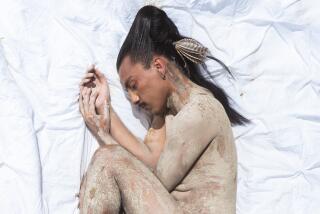Latina Beauty: Moving Beyond the Obvious
All of a sudden, I’m being targeted.
If it’s not Maybelline, it’s Cover Girl or Revlon. They’re after me--and all of my Latina sisters.
It seems the big secret is out: Latinas like to look good. Presentable, as our mothers like to say. (Yes, that’s Spanish for presentable). So corporate America is marketing directly to us, filling up our magazines and TV viewing with ads that make us feel special and noticed.
But do these stuffy white-shirts really get this Latina beauty thing? Is it just about formulating products that cater to our yellow undertones and add control to our wayward locks? Could it be more than skin-deep?
Claro que si! (of course!)
You wouldn’t know it if you depended on Hollywood and the media for your take on Latinas. On the big screen and the small one, Latinas usually are portrayed as air-headed sex kittens, interested only in polishing our appearances and pleasing our men.
Is there a bit of truth in the stereotype? Sure. Just ask the big U.S. cosmetic and hair-care manufacturers, which have finally figured out what Latinas have known for hundreds of years--the essence of our femininity has less to do with the opposite sex than with our own sense of womanhood.
So in the last year, marketers have been madly targeting my sisters, hoping to make big bucks as the brown-skinned population swells in a nation that continues to mostly trivialize us. Advice to marketers--begin with this simple question: Why is appearance so important in my culture?
“One thing Latinas all have in common is that we have a very fearless attitude about beauty,” says Latina magazine publisher Christy Haubegger, whose staff wrote “Latina Beauty,” which was released last week by Hyperion.
“We all know that woman who has, like the book says, ese algo (that something),” says the 32-year-old Mexican-American. “She’s a size 18, and you still think she looks good! You get the feeling that her beauty is not based on her waist size. It’s based on her attitude and her confidence.”
Not to mention her salsa gene:
“With our myriad of hair textures, our skin that ranges from alabaster to deep chocolate to sexy, smooth honey, what makes us beautiful is an inner spirit, and we all have part of it,” actress Daisy Fuentes writes in the foreword. “I call it the salsa gene. Expressing our salsa gene is the best thing we can do for ourselves. It give us permission to be as beautiful as we can be. It also defines what Latina beauty is: not a look but an attitude.”
That attitude, mainstream America is slowly discovering, prompts Latinas to flock to cosmetic counters, hair salons, and beauty supply stores more often than any other group of women. According to market research firm Yankelovich Partners: Latinas make up 11% of the nation’s population, but we buy 16% of the lipstick and 17.5% of the lip liner, and spend 43% more on fragrance products and 27% more on personal care products than non-Latinas. We also are 32% more likely to use nail polish four times a week and twice as likely to have spent $200 or more on hair care in the last six months.
Lessons in Latina femininity come early for most girls. Even as we’re learning to walk, our mamis, tias and abuelitas (mothers, aunts and grandmothers) subtly inculcate their mantras: Be a lady. Dress for success. Look presentable wherever you go--even if it’s going to the corner store.
“You don’t go out to the grocery store en bata de casa (in a robe) and rollers in your hair,” says 25-year-old Elizabeth Smoak-Bartolo, a Cuban-American who this year founded Ella Cosmetics, a line of makeup and skin care formulated exclusively for Latinas, in Pembroke Pines, Fla.
“No matter how poor you are, or where you come from, or whether you’re educated or not, you learn to have that pride in who you are and to represent yourself as someone who can hold a conversation and look presentable,” she says. Her culture’s emphasis on femininity helped Smoak-Bartolo believe she could succeed at any goal. But as positive as a smooth appearance can make a Latina feel, it also is true that plenty of Americans equate our preoccupation with beauty with shallowness or vanity.
*
Growing up in Miami, my sister and I never lacked in the wardrobe department, even though my father could not afford to do the same for himself or my mother. We were Cuban refugees, an automatic stigma, and this meant the children--especially the girls--needed to be well-rounded. We danced ballet, played piano, took French lessons, and learned to dress like people who belonged here.
We were not beaten over the heads with cosmetics trays nor did we spend hours at the hair salon. The lessons came slow and steady, watching my mother’s daily routine of donning nice slacks and shirts, dabbing on powder, blush and lipstick, and styling her hair even if she was staying home.
One aunt sewed us beautiful dresses and taught us the value of caring for our skin by pampering her own with moisturizers. At 72, her skin is as soft and as radiant as ever. Another aunt was more pragmatic, making it her business to point out the successful people in the streets. “Look at how she’s dressed,” she would say. “Look at how she carries herself. She has class.”
I knew nothing about cultural misconceptions until I left my Cuban cocoon in 1993 to take a journalism job in Atlanta. With few Latinos in the newsroom, it quickly became apparent that my co-workers liked me but tended to think I was plastic.
They complimented my outfits constantly, but could not reconcile my long, polished fingernails with my aggression on the coed football field. One editor--someone who thought highly of my work--confessed he was stunned that I went to mass and volunteered for an AIDS service agency because he assumed I was only concerned with improving my exterior.
When I moved to our nation’s capital for another job in 1997, I encountered a harsher response to my fashion taste. To be successful there, I needed to become masculine and compromise my sense of self. Slacks, I was advised by supervisors, were more suitable than the tailored suits or dresses I preferred.
Along the way, I met plenty of women of all races who also devote time and money to their wardrobes, hairstyles and makeup. But they were mostly admired for it while many Latinas complain they have been criticized or reprimanded about their looks--not their work.
Why is it that Latinas catch so much flack over the time we spend in front of the mirror?
“It can seem like vanity, but I think those who think that about us do not understand it’s part of our heritage,” says Smoak-Bartolo. “It’s deeply rooted. It’s a reflection of our grandmothers, our homeland and our pride.”
Isabelle Villasen~or’s late father used to tell his entrepreneurial daughter, owner of seven McDonald’s restaurants in Orange and Los Angeles counties: Hay que ser todo una mujer. You must be a complete woman.
“Your heart and your soul comes first,” Villasen~or of Corona Del Mar recalls her father saying. “But being dressed well is the packaging. So why not make it a pretty package?”
Yvette Anorga, 30, learned all about perceptions when she was growing up in Los Angeles from her mother who always seemed “like the most beautiful lady.”
“She used to tell me to go to bed by 7 because if I didn’t get sleep, I wasn’t going to be pretty,” Anorga says. “She didn’t like it if I was hanging out in sweats because she said you never know who’s going to come over. She didn’t make me be all glamorous, but she thought you should always look neat and clean. Appearance gives people their attitude.”
That is why Anorga takes time out from running a wholesale hair-care business with her husband and caring for their two young children to do her makeup every morning and visit the hair salon every week. It also explains my 85-year-old grandmother primping over her hair and face--and refusing to face the day unless she has a pretty cotton dress to wear.
“Latinas are strong women,” Anorga said. “It’s not like we drop our other responsibilities to be in front of the mirror. It’s just not a big deal. It’s a part of our everyday life.”
The point, says Haubegger, is not to choose cosmetics over character, but rather to cherish our faces and bodies as well as care for our minds and souls. “This is not about being shallow and only looking good,” Haubegger says. “We celebrate femininity, hips and all. That we care about so much about appearance is just a celebration of who we are.”
More to Read
Sign up for our Book Club newsletter
Get the latest news, events and more from the Los Angeles Times Book Club, and help us get L.A. reading and talking.
You may occasionally receive promotional content from the Los Angeles Times.






